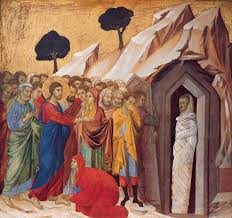Churches that have liturgies and even some that do not have a pericopal system that they follow, and there may be several of them. The year the Gospel lesson for Lent 5 is the story of the death of Lazarus and Jesus trip Bethany, his weeping and ultimate cry of “Lazarus come forth”. Tomorrow we get the whole story all of a piece. Sometimes the story comes after Easter and is extended over two Sundays. The first Sunday lesson stops at verse 16 where Thomas says that the disciples should go with Jesus in order to die with Him. Here is how one preacher explains it.
This is clearly ………… almost a serial sermon: Hurry back and see what happens next week. Will Jesus get to Bethany before Lazarus dies? What will Mary and Martha say when, to quote a modern dramatist, “God is late”? In the face of death do they have Boethius’ Consolation of Philosophy or a founded hope? What will Jesus do about His dead friend? Be sure to come. Don’t miss a single episode. This is not so facetious as it may sound, for there are three distinct episodes in the narrative. Nor does John neglect the full dramatic development of suspense. This actually involves more of the “poise of faith” than that of a well remembered Bible story with a happy ending. So in our pericope for today we dare say no more than can be said in this poise of faith. It is not fair to turn to the end of the chapter to sec how it comes out. Lazarus is dead. And Jesus raises no false hopes while testing the faith of Martha. She gives the answer we each must give when faced by death in the family cirde, that of faith and hope in the resurrection. Hers is a pre-Easter confession of faith. Ours is post-Easter. One other note in today’s sermon preparation: It is Cantate Sunday -Sing unto the Lord a new song. The Old Testament Lesson proclaims that “God is my Salvation, I shall not be afraid.” The Epistle reminds us that “God has brought us forth by the Word of truth.” In the Gospel Jesus tells His disciples in the Upper Room on Maundy Thursday that He is going away, but will send them the Spirit of truth. Each is a statement of founded hope, and Easter Christians may sing the new song of hope fulfilled. (Wayne Saffen)


